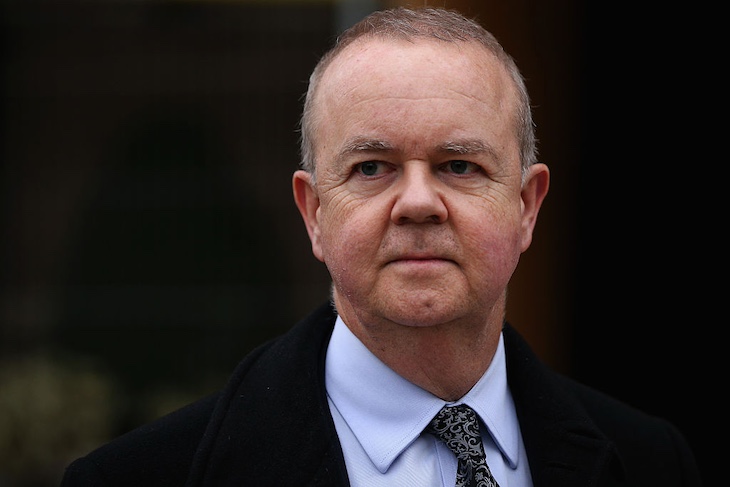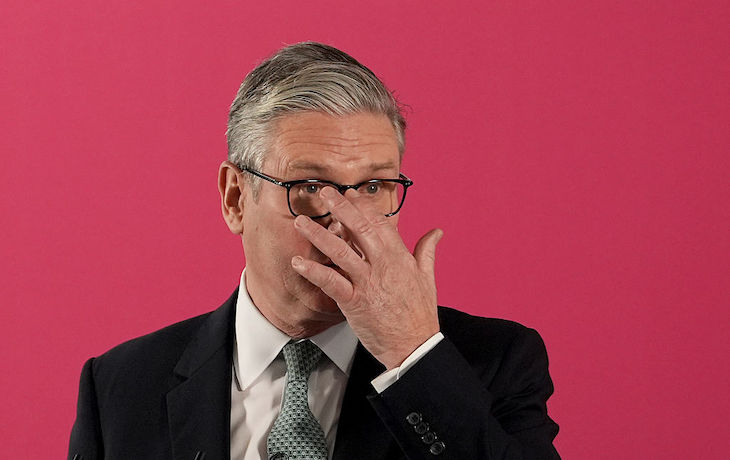What is the purpose of Private Eye? I know it’s supposed to be some kind of anti-establishment satirical magazine, boldly holding power to account and standing up for the little guy. But I must say I’m finding its response to the extraordinary police doorstepping of Telegraph columnist Allison Pearson rather puzzling.
You would think that this supposed thorn in the side of the powerful would sally out in defence of a fellow journalist being visited by the police because of something she posted online – not out of love for the journo in particular, but for the vital principle of free speech.
Should Pearson have had a notepad stashed in her dressing gown pocket just in case the cops came calling?
Sadly, however, it seems any such principles have fallen by the wayside. Private Eye’s fortnightly print schedule has finally got round to covering the Allison Pearson case and far from taking aim at the extraordinary overreach of Essex Police – say, by highlighting its woeful record of solving actual crimes – it has run a personal attack on Pearson herself. Pearson finds herself in the ‘Street of Shame’ column for allegedly ‘misreporting’ her encounter with police at her Essex home.
After plod came knocking earlier this month, Pearson and the Telegraph had reported that she stood accused of a ‘non-crime hate incident’ (NCHI), for a tweet the previous year. However, it later transpired she was under investigation for inciting racial hatred under the Public Order Act (a charge which has now been dropped entirely).
Private Eye‘s piece takes great issue with this discrepancy, essentially suggesting Pearson deliberately misled people. It sneers at her explanation: ‘Pearson, a journalist with 40 years’ experience, declared that she might have misheard the officers because she was “pretty shocked”.’ Instead, it insists this reflects her ‘characteristic grasp on factual accuracy’, as if she were just waiting for the police to visit so she could misrepresent the force.
It’s an extensive charge sheet against the conservative journalist, which Private Eye uses to write off the entire episode – yet its arguments scarcely stack up. For one thing, wouldn’t anyone, journalist or otherwise, be pretty shocked to have police turn up at their door on a Sunday morning? Should Pearson have had a notepad stashed in her dressing gown pocket just in case the cops came calling? It seems that in its dislike of Pearson, the magazine has forgotten the human element in all this. In any case, what is Pearson supposed to have gained by wrongly claiming she’d been accused of something else?
Private Eye gives much weight to a transcript released by Essex Police to dispute Pearson’s claims, which it says provides a ‘pretty comprehensive rebuttal’. The ‘transcript’ comprises just three lines spoken by an officer. Along with the force’s dubious assertion that ‘Essex Police supports free speech’, it clearly aims to present the police in a favourable light. An inquiring investigative magazine might be minded to ask why we haven’t been given the full transcript. Indeed, if the dispute is so cut and dry, why not release the bodycam footage, too?
In any case, whether or not Pearson reported what happened accurately, by using this minor factual discrepancy to rubbish the entire issue, Private Eye seems to be wilfully missing the wood for the trees. Whether it was an NCHI or anything else really shouldn’t matter – no one should be visited by the police over tweets, least of all Pearson. Numerous legal professionals have said her tweet came nowhere near the threshold for criminality, as proven by Essex police dropping the case. It’s nonsense to say that Pearson’s backers should have stopped defending her when it became clear she had been investigated for the far more serious offence of inciting racial hatred, for which the maximum penalty is seven years behind bars. Indeed, this fact makes her case more chilling, not less.
The Street of Shame continues to say that ‘there remains an important issue at the heart of all this’. Readers can probably think of some. Free speech, perhaps? The egregious waste of police time? The chilling effect on journalism? The fact that Essex Police upgraded Pearson’s case to a Gold Unit usually reserved for terror cases?
But none of those quite makes the cut. Instead, at last noting the outsize police resources devoted to this case, Private Eye asks: ‘Why, as with the shocking overreaction to the vigils for Sarah Everard in 2021, do the police appear to reserve their most heavy-handed action for cases in which they themselves are the ones being criticised?’ This may well be an issue. But it’s notable that Private Eye chooses an apparent instance of two-tier policing that’s three years old here. It’s almost as if it can’t bring itself to notice the more glaring recent examples of varying police priorities because it’s politically incorrect to do so.
In case you thought this anti-free speech line was an isolated incident, the same edition also carries a spoof piece justifying the police’s decision to knock on Pearson’s door:
We have woken up to an Orwellian, Kafka-esque nightmare dystopia where the police can just turn up, knock on your door in the middle of the day, and subject you to a polite request for a quiet word! And all because someone, somewhere, has taken offence at your tweet to your 189,000 followers – which was so innocent that you deleted it immediately, and then told the police you couldn’t remember what it was!
In its desire to make light of Pearson’s ordeal, Private Eye manages to turn her doorstepping by the police into ‘a request for a quiet word’. It then implies, contrary to mountains of evidence, that the only people who need fear a knock on the door by the police are those who have tweeted ‘libellous drivel and lazy misinformation online’ – in other words, people who probably deserved it. It also attempts to suggest the right is only concerned about Pearson’s case for cynical reasons. In fact, Pearson’s treatment has been labelled ‘Stasi-like’ by a Labour MP, criticised by old-school lefty Suzanne Moore, and even called out by Sir Keir Starmer himself.
In the end, it seems like only the ‘liberal’ left have been unable to see the Pearson case as a disturbing case of police overreach. Other to have taken aim at Pearson include ex-BBC hacks at The News Agents podcast, who have accused Pearson of a ‘persecution complex’, and the production company behind Have I Got News For You in a now-deleted tweet. A writer in the Guardian has called it a ‘non-scandal’ and cries that ‘“free speech” has been weaponised’.
These establishment figures may delude themselves that they’re speaking truth to power, but they share, as Niall Gooch noted earlier this year of Ian Hislop, a ‘concept of the Establishment [that] seems to be stuck in about 1952’. And that explains a lot. Only someone so out of touch with the reality of social power today could call themselves a liberal, yet see the police being sent to a journalist’s door and cheer it on.







Comments